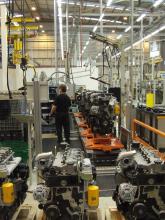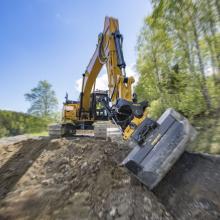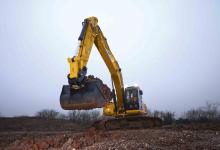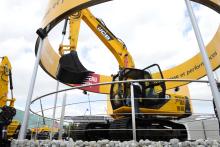A fleet of JCB excavators is playing a major role in a road construction project only metres from the factory where they were built. Derbyshire-based earthmoving specialist JC Balls is working for a Carillion-Tarmac joint venture on the A50 Growth Corridor Project A. The contract is part of the National Infrastructure Plan and consists of constructing a grade-separated junction on the A50 dual carriageway to the west of the town of Uttoxeter. Project managed by Amey, the scheme is creating three new
Back to the beginning: JCB excavators work close to their factory
A fleet of 255 JCB excavators is playing a major role in a road construction project only metres from the factory where they were built.
Derbyshire-based earthmoving specialist JC Balls is working for a Carillion-Tarmac joint venture on the A50 Growth Corridor Project A. The contract is part of the National Infrastructure Plan and consists of constructing a grade-separated junction on the A50 dual carriageway to the west of the town of Uttoxeter.
Project managed by Amey, the scheme is creating three new roundabouts, two to the south and one to the north of the A50 dual carriageway. These have been joined by a new bridge structure and there will be extended slip roads to ease congestion on this busy trunk road.
JC Balls employs over 100 people and operates more than 50 machines and 30 trucks. On the Growth Corridor contract, the company is operating a mixed fleet, including three 22tonne JCB JS220 crawler excavators, a 36tonne JS370, a wheeled JS175W and a 57C-1 compact excavator. Other machinery includes a JCB 714 articulated site dumper and a JCB VM115 soil compactor.
Bought specifically for the A50 project, one of the JS220 models is equipped with an Engcon E226 tilt-rotator and an Engcon Positioning System. This is used in combination with a Trimble 3D machine control system for improved levels of control and accuracy.
“Around 90% of our machinery on the project is already equipped with GPS machine control and it can cut the time on site almost by half,” said Dane Potts, JC Balls contracts manager. “GPS-guided machines have helped eliminate the need for ground operatives to walk along steeper batter faces to check for levels, which not only saves time but is a far safer method.”
Tricky construction details are made easy by a simple level adjustment on the GPS controller. The combination of GPS with the Engcon tilt rotator has made a difference in productivity, said Potts.
Six 47m-long steel bridge beams were lifted recently into place across the A50 and are resting on piers made using 210,000tonnes of pulverised fuel ash from nearby Rugeley Power Station. Around 30,000m³ of existing material has been stabilised with the addition of lime to increase structural properties and reduce the amount of soil taken from the site.
The project is expected to be completed by November next year when it will provide improved access and reduced congestion to this busy cross-country trunk road.
Derbyshire-based earthmoving specialist JC Balls is working for a Carillion-Tarmac joint venture on the A50 Growth Corridor Project A. The contract is part of the National Infrastructure Plan and consists of constructing a grade-separated junction on the A50 dual carriageway to the west of the town of Uttoxeter.
Project managed by Amey, the scheme is creating three new roundabouts, two to the south and one to the north of the A50 dual carriageway. These have been joined by a new bridge structure and there will be extended slip roads to ease congestion on this busy trunk road.
JC Balls employs over 100 people and operates more than 50 machines and 30 trucks. On the Growth Corridor contract, the company is operating a mixed fleet, including three 22tonne JCB JS220 crawler excavators, a 36tonne JS370, a wheeled JS175W and a 57C-1 compact excavator. Other machinery includes a JCB 714 articulated site dumper and a JCB VM115 soil compactor.
Bought specifically for the A50 project, one of the JS220 models is equipped with an Engcon E226 tilt-rotator and an Engcon Positioning System. This is used in combination with a Trimble 3D machine control system for improved levels of control and accuracy.
“Around 90% of our machinery on the project is already equipped with GPS machine control and it can cut the time on site almost by half,” said Dane Potts, JC Balls contracts manager. “GPS-guided machines have helped eliminate the need for ground operatives to walk along steeper batter faces to check for levels, which not only saves time but is a far safer method.”
Tricky construction details are made easy by a simple level adjustment on the GPS controller. The combination of GPS with the Engcon tilt rotator has made a difference in productivity, said Potts.
Six 47m-long steel bridge beams were lifted recently into place across the A50 and are resting on piers made using 210,000tonnes of pulverised fuel ash from nearby Rugeley Power Station. Around 30,000m³ of existing material has been stabilised with the addition of lime to increase structural properties and reduce the amount of soil taken from the site.
The project is expected to be completed by November next year when it will provide improved access and reduced congestion to this busy cross-country trunk road.









